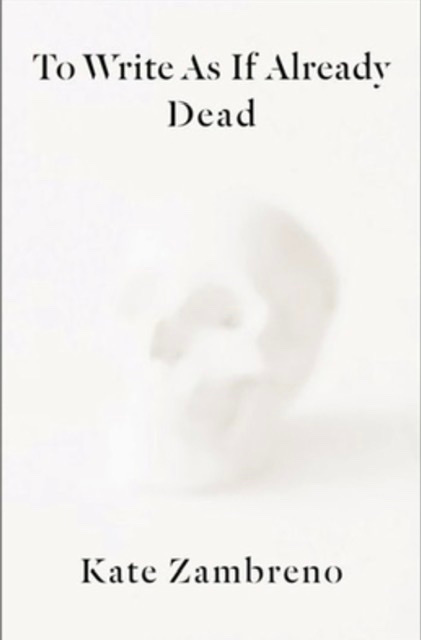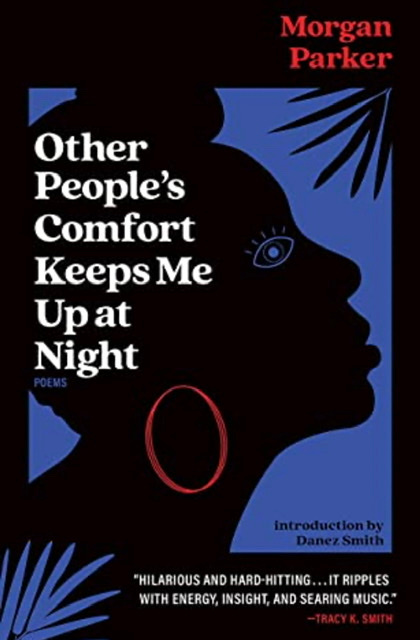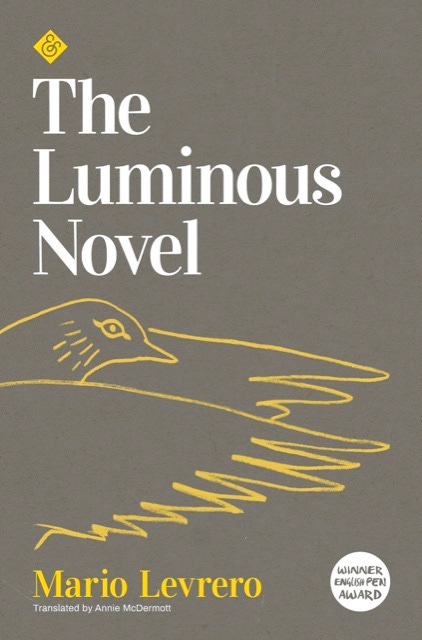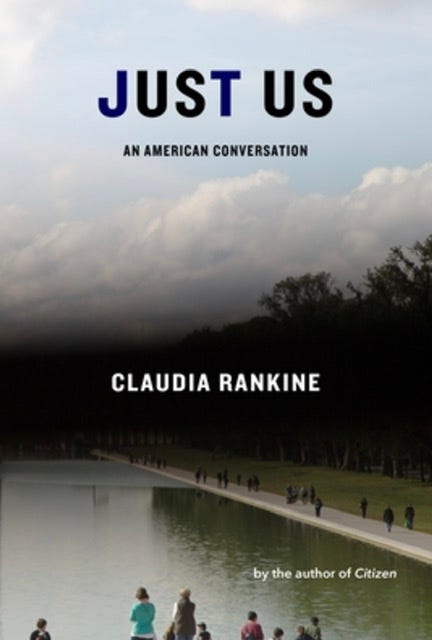To Write As If Already Dead
by Kate Zambreno
I have now read Kate Zambreno’s new book To Write as If Already Dead twice in the space of three months. A recent interview with T Fleischmann made me realize one of the reasons I love her books so much (I’ve read seven of her eight books, several of them multiple times), which has to do with blogging. In the interview, she talks about writing to get back to the space of blogging and what blogging meant for her back during the years hers was active (she is now mostly off the internet). Blogging for her was in part about documenting thought: it was a space to think through ideas in writing, to let the writing be the thinking. It was also a space of community. She and other bloggers and commenters collaborated and formed friendships that were intellectual and emotional and deeply meaningful.
I loved my years of blogging too, although my blog wasn’t nearly as smart as I’m sure Zambreno’s was — I never read it, unfortunately. But I, too, started blogging to think through ideas in an informal way — to create a record of what I read and thought but also to create the thought itself, to think better because I was writing. My blogging community was also central, and many friendships from that time remain, if in different forms now.
I’m realizing how much I love the kind of writing blogging allows and even encourages, and I love Zambreno’s work because it’s also that kind of writing, or shares its qualities: it’s exploratory, experimental, and meandering; it has episodic qualities and repetitions that invoke dailiness. It exists in community, incorporating the words and ideas of friends. It engages with books and authors and artists. It’s deeply intellectual and deeply personal. This is the kind of book I want to read, and if I wrote books, this is how I would try to write. I’ve tried to restart my blog because I too want this space back, but I didn’t feel the old energy was there. I suppose this newsletter is the result.
To Write as If Already Dead is explicitly about blogging, at least in its first half. This part is a novella similar in form to Zambreno’s novel Drifts: it’s fiction, but based on details from Zambreno’s life. The second half is a notebook documenting her attempts to write a study of Hervé Guibert's book To the Friend Who Did Not Save My Life. It also IS the study and an account of her life during the winter of 2019 and 2020 as she discovers she is pregnant with her second child and then COVID hits.
The first half documents the narrator’s friendship with Alex Suzuki, a commenter on her blog who emails her and begins a regular correspondence that touches especially on issues of identity, online personas, and community. “Alex Suzuki” is the pseudonym of a poet who wanted to create an online alter ego that would allow her to have what she felt were more authentic conversations about literature than she could have under her real name. Alex Suzuki, according to the narrator, believed that:
Blogging was like being a writer and a reader at the same time … being able to interact directly and personally with the writer, an intimate experience that spoke to what literature should be at its core.
Alex Suzuki and the narrator develop an intense relationship, but then it ends, and the narrator is left to contemplate what happened to her and all the questions their relationship opened up about authenticity, friendship, reading, and writing.
In typical Zambreno fashion, however, it takes awhile to get to the Alex Suzuki story; first, the book is about finding space and time to write, and it’s about the purpose of writing, which is to puzzle out a problem. Here is how the book opens:
There comes a moment when you are finally given some space and quiet, maybe an hour, possibly two, the occasional birdsong by an open window, and you must go to that other room and return to the problem you’ve been attempting to unravel. It’s difficult to believe how much time has passed since you last attempted to work through this problem, this problem which is the problem of a friendship.
From here she immediately moves to Édouard Manet’s The Funeral, a painting she would visit in the Metropolitan Museum while holding her baby or pushing the baby in a stroller. This painting is said to show Charles Baudelaire’s funeral, which Manet attended. Baudelaire, Zambreno’s narrator notes, wrote to Manet chiding him for caring about the poor reception his paintings received: “Do you believe you are the first man to find yourself in such a place? Have you more genius than Chateaubriand and Wagner? People mocked them quite a lot don’t you know. They did not die from it.”
Zambreno is laying out her themes: the writer at work, being a writer and thinker and also a mother, friendship, letters, the material conditions in which art gets made, and the artist’s relationship to viewers/readers and critics. She also obliquely references the pandemic, imagining paintings hanging on the wall alone, with no one to see them since the museum has closed: “Are they covered over, like a shroud?” The question implies another question: Does art die if it has no audience?
On the book’s second page, working associatively, she moves on to Hervé Guibert, the ostensible subject of her book, and the death of his friend Michel Foucault. People in Foucault’s circle were worried that his funeral might be more sparsely attended than Roland Barthes’s was. Both Barthes and Foucault died in the same hospital, “anonymously because that is how one dies”:
And yet others on their behalf sought to ensure a legacy in the form of a large funeral crowd for the two theorists who argued that the author must disappear within their text, first Barthes in 1967’s “The Death of the Author,” and then Foucault’s challenge, two years later, in “What is an Author?” The best distinction I’ve read between the dueling essays is that Barthes wants to kill the author, Foucault wants the author to take on the appearance of a dead man.
And there we have it, sort of. This last line is another version of Zambreno’s title: to write as if already dead, a phrase that comes from Marguerite Duras, as paraphrased by Alex Suzuki. It evokes Hervé Guibert’s state of writing while knowing he would die from AIDS, which he did in 1991 at the age of 36. It also evokes the attempt to write honestly, without concern for one’s reputation and what one’s friends will think — to write as if there are no consequences. The author as a ghost — the author choosing to write as a ghost, or trying to. Or, one step further: the author writing as a ghost and then recording what that experience is like. The author as both presence and absence.
In the following pages of the book’s opening, Zambreno continues working associatively: more Manet; more Foucault, Barthes, and Guibert; more about the narrator’s attempts to work; more about trying to think and work while having a body. She writes about friendship, illness, pregnancy, the exhaustion of parenting, and also Sebald and Rilke. Finally, we come to the story of Alex Suzuki, and from there we go on to the study of Guibert, a study in the form of a notebook.
It all fits; the book is a whole made up of loosely-related pieces that somehow cohere. The book is not at all a blog, but its shape is blog-like, unified and fragmented all at once.
I have been circling around this book, trying to capture the feeling of reading it but able to discuss it only in pieces. But that’s okay, because this is a book that circles around its own subjects and is about the very act of circling. It’s a whirling, unsettled book that inspires whirling, unsettled thoughts.
Recently Published
New (mostly) small-press books out in the last month that I haven’t yet read and am adding to my TBR. All quotations below are from the publisher:
Other People’s Comfort Keeps Me Up At Night by Morgan Parker (Tin House): this is a reissue of a poetry collection originally published in 2015. “Parker bobs and weaves between humor and pathos, grief and anxiety, Gwendolyn Brooks and Jay-Z, the New York School and reality television.”
Black Box: The Memoir That Sparked Japan’s #MeToo Movement by Shiori Ito, translated by Allison Markin Powell (Feminist Press): a memoir that “chronicles one woman's struggle for justice, calling for changes to an industry--and in society at large--to ensure that future victims of sexual assault can come forward without being silenced and humiliated.”
Elena Knows by Claudia Piñeiro, translated by Frances Riddle (Charco Press): crime in translation! “After Rita is found dead in a church she used to attend, the official investigation into the incident is quickly closed. Her sickly mother is the only person still determined to find the culprit.”
Strange Beasts of China by Yan Ge, translated by Jeremy Tiang (Melville House): fantasy in translation! “In the fictional Chinese city of Yong'an, an amateur cryptozoologist is commissioned to uncover the stories of its fabled beasts. These creatures live alongside humans in near-inconspicuousness--save their greenish skin, serrated earlobes, and strange birthmarks.”
The Woman From Uruguay by Pedro Mairal, translated by Jennifer Croft (Bloomsbury): a “story of two would-be lovers over the course of a single day.”
Always Crashing in the Same Car: On Art, Crisis, and Los Angeles, California by Matthew Specktor (Tin House): this sounds like my kind of nonfiction. “Part memoir, part cultural history, part portrait of place, Always Crashing in the Same Car explores Hollywood through a certain kind of collapse.”
Made in China: A Memoir of Love and Labor by Anna Qu (Catapult): “A young girl forced to work in a Queens sweatshop calls child services on her mother in this powerful debut memoir about labor and self-worth that traces a Chinese immigrant's journey to an American future.”
The Luminous Novel by Mario Levrero, translated by Annie McDermott (And Other Stories): I know a lot of people avoid them, but I love novels about writers. “A writer attempts to complete the novel for which he has been awarded a big fat Guggenheim grant, though for a long time he succeeds mainly in procrastinating.”
The Things We’ve Seen by Agustín Fernández Mallo, translated by Thomas Bunstead (Fitzcarraldo Editions): “Written in three parts, The Things We've Seen is a dazzling and anarchic exploration of social relations which offers thought-provoking ideas on our perceptions of humanity, history, violence, art and science.”
Waiting for the Waters to Rise by Maryse Condé, translated by Richard Philcox (World Editions): “Babakar is an African doctor living alone until the child Anaïs comes into his life. Forced to abandon his solitude, he takes her to Haiti in search of her family.”
Recently Acquired
I’ve acquired so many books since the last time I sent a newsletter that it’s utterly ridiculous. Just absurd. So here are some highlights, since the idea of listing them all is overwhelming:
Where Reasons End by Yiyun Li (Random House, 2019): so many people have praised this book! I understand it’s a heartbreaker, but I’m here for that kind of book: “Composed in the months after she lost a child to suicide, Where Reasons End trespasses into the space between life and death as mother and child talk, free from old images and narratives.”
Winter in Sokcho by Elisa Shua Dusapin, translated by Aneesa Abbas Higgins (Open Letter, 2021): this is set in a tourist town on the border between North and South Korea, “a novel about shared identities and divided selves, vision and blindness, intimacy and alienation.”
DMZ Colony by Don Mee Choi (Wave Books, 2020): winner of the 2020 National Book Award for poetry. It “captures the migratory latticework of those transformed by war and colonization.”
The Gate by Natsume Soseki, translated by William F. Sibley (NYRB, originally published in 1909): “A humble clerk and his loving wife scrape out a quiet existence on the margins of Tokyo.”
Journey by Moonlight by Antal Szerb, translated by Len Rix (NYRB, originally published in 1937): “a darkly comic novel cut through by sex and death, which traces the effects of a socially and sexually claustrophobic world on the life of one man.”
River by Esther Kinsky, translated by Iain Galbraith (Transit, 2018): I liked Kinsky’s book Grove. In this one, “Over a series of long, solitary walks [a woman] reminisces about the rivers she has encountered during her life, from the Rhine, her childhood river, to the Saint Lawrence, and a stream in Tel Aviv.”
An Inventory of Losses by Judith Schalansky, translated by Jackie Smith (New Directions, 2020): “Each disparate object described in this book--a Caspar David Friedrich painting, a species of tiger, a villa in Rome, a Greek love poem, an island in the Pacific--shares a common fate: it no longer exists, except as the dead end of a paper trail.”
Just Us: An American Conversation by Claudia Rankine (Graywolf, 2021): “As everyday white supremacy becomes increasingly vocalized with no clear answers at hand, how best might we approach one another? Claudia Rankine, without telling us what to do, urges us to begin the discussions that might open pathways through this divisive and stuck moment in American history.”
Currently Reading
Selected Letters by John Keats: I have been in the mood to read great letters from great writers, so I picked this one up. I will probably finish in six months, since I’m reading it very slowly, but that’s okay.
Homie by Danez Smith (Graywolf, 2020): my current poetry book.
The Walk by Robert Walser, translated by Susan Bernofsky (New Directions, originally published in 1917): I’m finally reading Robert Walser!
The Cormac Report
Cormac is deep in summer mode, which means sleeping in until 9ish, working on writing projects, and getting a little bit bored (and then playing video games). He’s also doing a lot of reading. I’ve run into a problem where we order books from our local bookstore, we go to pick them up, and then on the way home he finishes them. Or he finishes them later that evening (graphic novels and early middle grade books don’t take long). I mean, it’s not a problem, exactly, I’m glad he’s reading, but keeping him supplied with books is a challenge. Fortunately he likes to reread, so he gets more out of his new books that just entertainment on the car ride home. Yes, we should probably use the library more, but his rereading habit is a large part of why we don’t. He doesn’t like the idea of having to give the books back, and I can’t say I blame him (although I do use the library a lot myself). So I’ve been sending a steady stream of orders over to the bookstore, and the books in his bedroom are piling up. I … think I’m okay with this?
Programming note: I’ll probably miss another week or two because of upcoming travel plans (cabin, mountains), so enjoy the rest of your August and I’ll be back soon.
Have a good week everyone!






Just Us is amazing. You are in for some excellent reading. Have a lovely vacation!